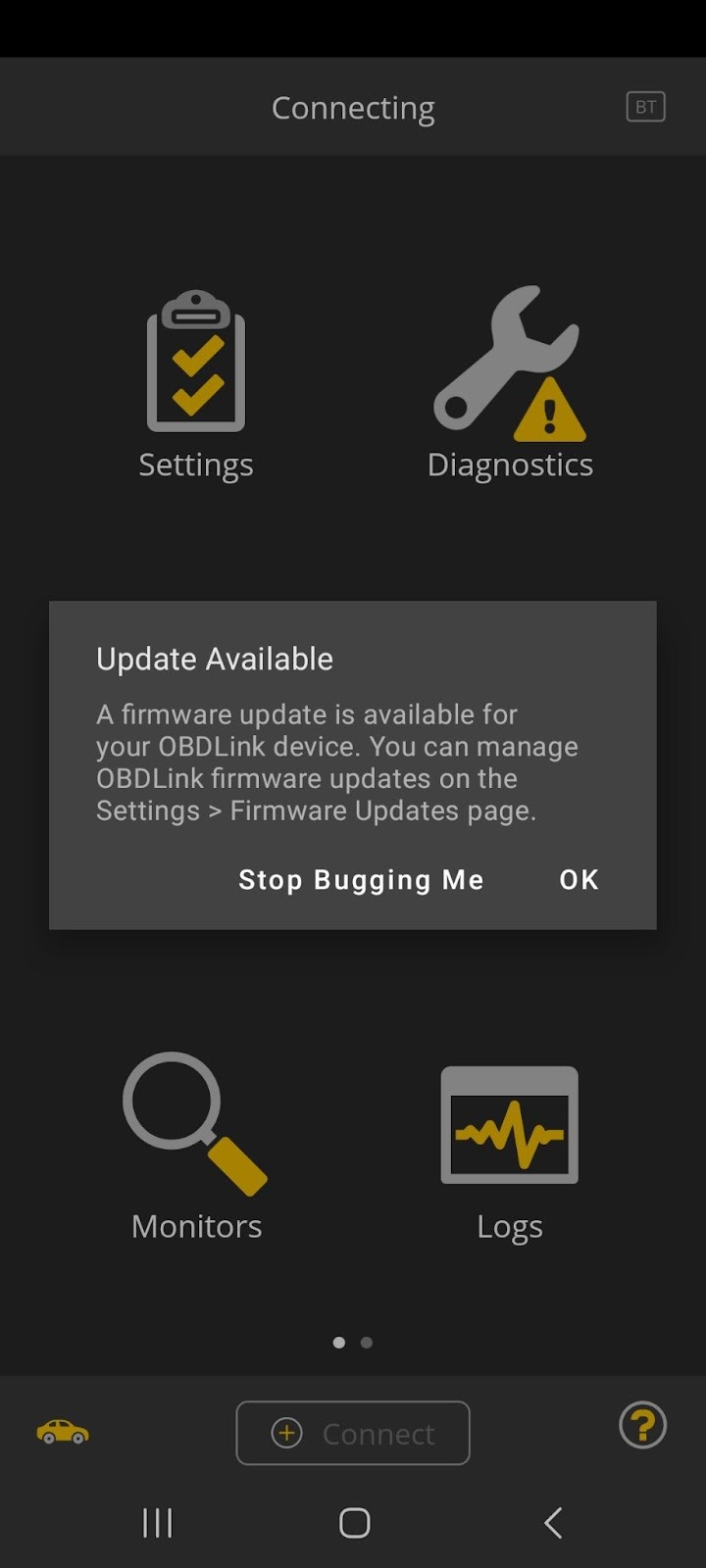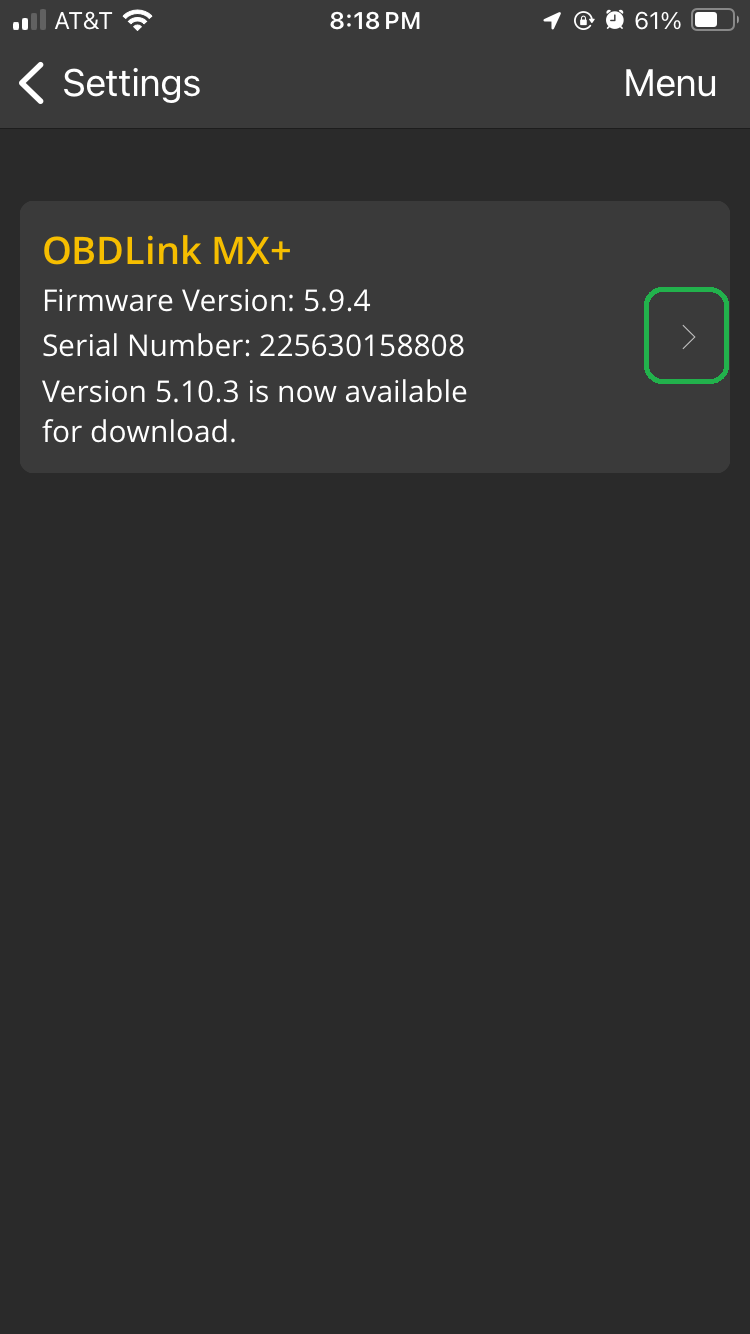Our development team periodically releases new updates to the OBDLink® adapter firmware. We recommend that you update to the newest version for optimal performance.
Note: We recently updated the OBDLink app and made improvements to its features and how it looks. The icons on the app's home screen now have a yellow accent instead of blue (iOS) and green (Android) accents. This revised article matches the updated app’s screens and features. Download the latest version of the OBDLink app from the App Store (iOS) or Google Play (Android) to take advantage of the updated app's features and performance.
The following table lists the application to use for firmware updates for your OBDLink model and operating system.
| OBDLink Adapter | Operating System | Application to use for firmware updates |
|---|---|---|
| OBDLink MX+ | Android, iOS | OBDLink App |
| Windows | STN Firmware Updater | |
| OBDLink CX | Android, iOS | OBDLink App |
| OBDLink LX | Android | OBDLink App |
| Windows | STN Firmware Updater | |
| OBDLink EX | Android | OBDLink App (requires USB On-the-Go cable*) |
| Windows | STN Firmware Updater | |
| OBDLink SX | Android | OBDLink App (requires USB On-the-Go cable*) |
| Windows | STN Firmware Updater | |
* A USB On-the-Go (OTG) cable is required to connect OBDLink EX and OBDLink SX (not included with purchase). | ||
If you use the OBDLink app, you will see a notification message when a firmware update is available for your OBDLink adapter. For detailed steps on how to update your firmware, see the Update firmware with the OBDLink app section of this article.
| iOS | Android |
If you use the OBDwiz software for Windows, you will not see a notification message when a firmware update is available. For detailed steps on how to update your firmware, see the Update firmware with a Windows PC section of this article.
TABLE OF CONTENTS
Update firmware with the OBDLink app
Before you begin, be sure to:
- Start your vehicle.
- On your phone/tablet, open the OBDLink app and connect to your OBDLink adapter.
- Make sure your phone/tablet is not streaming to any other Bluetooth/BLE devices.
- Make sure any other devices paired with the OBDLink adapter have Bluetooth turned off.
Note: In this article, iOS screenshots are shown on the left and Android screenshots are shown on the right.
- Confirm that your phone/tablet is Connected to the OBDLink adapter.
iOS Android In the OBDLink app, navigate to Settings > Firmware Updates.
You will see the current firmware version for your OBDLink adapter.
Tap Menu (iOS) or 3 dots (Android) and tap Check For Updates.Review the status for your adapter to see if a new firmware version is available.
If your adapter status says This device is up to date, then you do not need to update firmware. Tap the back arrow (<) two times to return to the home screen.
If your adapter status says Version n.n.n is now available for download as shown below, then tap the forward arrow (>) to open firmware details.
You will see the installed firmware version (highlighted) and details for the new version, if one is available.
To download and install the update, scroll down to the bottom of the screen and tap Download.- After the firmware is downloaded, scroll down to the bottom of the screen and tap Update Firmware.
- Tap Update Firmware again in the confirmation screen.
- This process will take about 3-5 minutes. You will see a completion message when the firmware installation is complete.
Tap OK and go back to the Home screen.
- After the firmware loading process, your OBDLink adapter will be disconnected.
In the Home screen, tap Connect to connect to your OBDLink adapter.
Connection issues
After you update the firmware, your OBDLink adapter may not connect to your phone/tablet right away. Try these tips:
- Unplug your OBDLink adapter and plug it back in again.
- Check the Bluetooth settings for your phone/tablet and select your OBDLink adapter.
If you have other issues after completing the firmware update, see Troubleshooting in this article.
Update firmware with a Windows PC
To install a firmware update using a Windows PC, download and run the STN Firmware Updater (a Windows utility) to connect to your OBDLink adapter as described below.
- Download the STN Firmware Updater utility.
- Run the Install-StnFirmwareUpdater.exe file.
Connect to your OBDLink adapter.
Click Upload and the updater will start the process.
When the process is complete, the updater will show that your adapter is up-to-date.
Click Disconnect and close the STN Firmware Updater.
After the update is complete, use the OBDLink App or OBDwiz software to connect the OBDLink adapter to your phone/tablet or Windows PC.
The Software & Firmware Updates page lists the latest available versions. We recommend that you use the STN Firmware Updater to automatically download the correct firmware for your adapter model.
Be aware that firmware for all adapter revisions may not be listed on this page.
- OBDLink MX+ https://www.scantool.net/downloads/updates/obdlink_mxp/
- OBDLink CX You must use the OBDLink app to update firmware for this adapter.
- OBDLink LX https://www.scantool.net/downloads/updates/obdlink_lx/
- OBDLink EX https://www.scantool.net/downloads/updates/obdlink_ex/
- OBDLink SX https://www.scantool.net/downloads/updates/obdlink_sx/
Troubleshooting
The symptoms below may indicate that the firmware update was not successfully completed:
- Button/Factory reset doesn't work (OBDLink MX+ and LX adapters only)
- Error message - Command timed out
If you experience these symptoms, try the procedures below:
- For OBDLink EX and SX adapters, retry the process using the Windows tool (see Update firmware with a Windows PC above).
- For OBDLink MX+, LX, and CX adapters, follow the process below to troubleshoot your Bluetooth connection and retry the update process.
Retry firmware update using the OBDLink app
If a firmware update has failed, the OBDLink adapter is still recoverable. Follow the steps below to retry the firmware update.
- Make sure your phone/tablet is not streaming to any other Bluetooth/BLE adapters.
- Make sure all other devices paired with the OBDLink adapter have Bluetooth turned off.
- Disable other third-party OBD applications that use the OBDLink adapter, such as Torque Pro or similar.
- Power cycle the OBDLink adapter (unplug it from the OBD port, wait 10 seconds, and plug it in again).
- iOS users only: Confirm that your phone/tablet is Connected to the OBDLink adapter on the Settings > Bluetooth menu.
Note: Do not tap the OBDLink app CONNECT button at any time during this procedure. - In the OBDLink app, navigate to Settings > Firmware Updates.
You will see the current firmware version for your OBDLink adapter.
Tap Menu (iOS) or 3 dots (Android) and tap Check For Updates.- Review the status for your adapter to see if a new firmware version is available.
If your adapter status says Version n.n.n is now available for download as shown below, then tap the forward arrow (>) to open firmware details.
You will see the installed firmware version (highlighted) and details for the new version, if one is available.
To download and install the update, scroll down to the bottom of the screen and tap Download.
Note: If you have already downloaded the latest firmware, the button will say Update Firmware as shown in the next step. - After the firmware is downloaded, scroll down to the bottom of the screen and tap Update Firmware.
- Tap Update Firmware again in the confirmation screen.
- This process will take about 3-5 minutes. You will see a completion message when the firmware installation is complete.
Tap OK and go back to the Home screen.
Device recovery when OBDLink app has been reinstalled
If a firmware update has failed and you have uninstalled/reinstalled the OBDLink app, follow the steps below to recover your adapter using the built-in firmware recovery utility.
Note: Do not tap the OBDLink app CONNECT button at any time during this procedure.
- Make sure your phone/tablet is not streaming to any other Bluetooth/BLE adapters.
- Make sure all other devices paired with the OBDLink adapter have Bluetooth turned off.
- Disable other third-party OBD applications that use the OBDLink adapter, such as Torque Pro or similar.
- Power cycle the OBDLink adapter (unplug it from the OBD port, wait 10 seconds, and plug it in again).
- iOS users only: Confirm that your phone/tablet is connected to the OBDLink adapter on the iOS Settings > Bluetooth menu.
- Verify the proper Communication Type is selected under Settings > Preferences > Communications > Communication Type.
Tap Bluetooth. Tap Bluetooth. Confirm your adapter is selected and tap OK. Confirm your adapter is selected and tap OK. - Navigate to Settings > Firmware Updates.
Note: You may see a pop-up message saying “OBDLink Device Not Found”.
This is normal if there are no OBDLink adapters registered. Tap OK.Tap the Menu button, then
tap Firmware Recovery.Tap the Menu icon (3 vertical dots),
then tap Firmware Recovery.Tap Yes to continue.
Tap Yes to continue.
- You will see the current firmware version for your OBDLink adapter.
Tap Menu (iOS) or 3 dots (Android) and tap Check For Updates. - Review the status for your adapter to see if a new firmware version is available.
If your adapter status says Version n.n.n is now available for download as shown below, then tap the forward arrow (>) to open firmware details.
You will see the installed firmware version (highlighted) and details for the new version, if one is available.
To download and install the update, scroll down to the bottom of the screen and tap Download.
Note: If you have already downloaded the latest firmware, the button will say Update Firmware as shown in the next step. - After the firmware is downloaded, scroll down to the bottom of the screen and tap Update Firmware.
- Tap Update Firmware again in the confirmation screen.
- This process will take about 3-5 minutes. You will see a completion message when the firmware installation is complete. Tap OK and go back to the Home screen.
Learn more
- You can explore other OBDLink features and functionality using our support article knowledge base.
- For descriptions of terms used in this article, see the Glossary of Acronyms and Terms.
Need more help?
OBDLink® is a registered trademark of OBD Solutions, LLC.





































